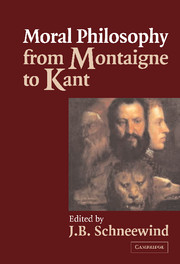Book contents
- Frontmatter
- Contents
- Preface
- Acknowledgments
- Foreword to the One-Volume Reprint
- Introduction
- PROLEGOMENA: SOME QUESTIONS RAISED
- PART I REWORKING NATURAL LAW
- PART II INTELLECT AND MORALITY
- Guillaume Du Vair
- René Descartes
- Benedict de Spinoza
- Nicholas Malebranche
- Ralph Cudworth
- Samuel Clarke
- Gottfried Wilhelm Leibniz
- Christian Wolff
- PART III EPICUREANS AND EGOISTS
- PART IV AUTONOMY AND RESPONSIBILITY
- Supplemental Bibliography
Samuel Clarke
Published online by Cambridge University Press: 05 June 2012
- Frontmatter
- Contents
- Preface
- Acknowledgments
- Foreword to the One-Volume Reprint
- Introduction
- PROLEGOMENA: SOME QUESTIONS RAISED
- PART I REWORKING NATURAL LAW
- PART II INTELLECT AND MORALITY
- Guillaume Du Vair
- René Descartes
- Benedict de Spinoza
- Nicholas Malebranche
- Ralph Cudworth
- Samuel Clarke
- Gottfried Wilhelm Leibniz
- Christian Wolff
- PART III EPICUREANS AND EGOISTS
- PART IV AUTONOMY AND RESPONSIBILITY
- Supplemental Bibliography
Summary
Introduction
Samuel Clarke was not only a moral philosopher, he was also a theologian, a defender and popularizer of Newton, and a successful Anglican minister whose sermons were much admired. Born in 1675, he studied at Cambridge, where he had to learn Newton's Principia by himself because no one on the faculty understood it well enough to help him. Clarke translated a textbook of Cartesian physics into Latin, inserting Newtonian doctrines into the footnotes to contradict the author he was translating. This textbook was used at Cambridge as late as 1730. When he graduated, Clarke entered the Church of England and eventually became chaplain to Queen Anne, who appointed him to a prosperous London church, where he remained until his death in 1729. Clarke was suspected of Unitarian leanings, however, and this lack of orthodoxy regarding the doctrine of the Trinity lost him his chaplaincy and kept him from further advancement.
Clarke's most enduring works were the lectures he gave in the series established by the scientist Robert Boyle, who was eager to encourage up-to-date defenses of the truth of Christianity. Clarke's Boyle lectures, A Discourse Concerning the Being and Attributes of God (1704) and A Discourse Concerning the Unchangeable Obligations of Natural Religion (1705), made him one of the most influential and frequently reprinted philosophers of the early eighteenth century. A decade after giving these lectures, Clarke began a correspondence with Leibniz, answering Leibniz's criticisms of Newton's views of space, time, and gravity. He and Leibniz each wrote five letters, which were published in 1717.
- Type
- Chapter
- Information
- Moral Philosophy from Montaigne to Kant , pp. 293 - 312Publisher: Cambridge University PressPrint publication year: 2002

